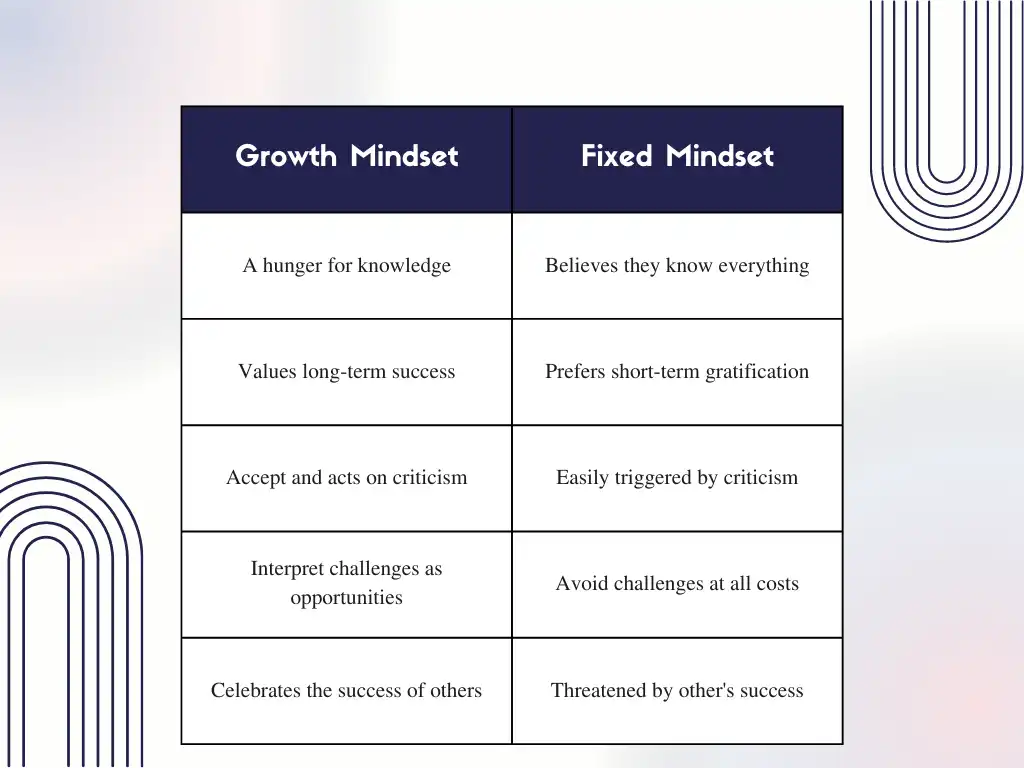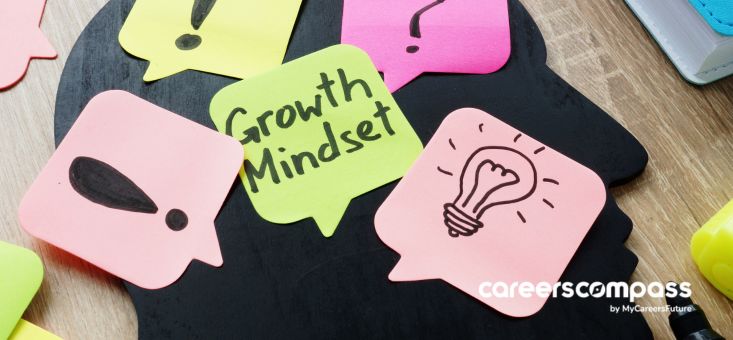Consider what you hope to achieve from your career – it could be to make the most out of it or simply to earn enough to ‘get by‘. The choices you make are pre-determined by your mindset: the growth mindset or the fixed mindset.
People with a growth mindset constantly seize opportunities to improve themselves, whereas those with a fixed mindset lean toward familiarity, with their minds often set in stone.
In fact, our mindset is fundamental for our development. Besides learning, it impacts various aspects of our lives, such as careers, relationships, and lifestyles. It shapes our character, seeps into our speech, and moulds our decisions and actions. A mindset is a belief and is also something that can change and evolve over time.
Fixed mindset
A fixed mindset dismisses people from the privilege of ‘becoming‘; they already have to be. Those with such a mindset see criticisms as ugly marks and equate failure to incompetence, blaming others or giving up when faced with failure.
Some may also dwell overly on past praises and affirmations to weave a permanent truth about their competence, therefore lacking the motivation to work hard. With a fixed mindset, they insist that they either have the talent or don’t.
Growth mindset
People who adopt a growth mindset are the opposite. With a mindset centred on self-development rather than outdoing others, they understand that resilience and deliberate practice works best, thus finding value in their work no matter the outcome.
Failure does not faze them easily or for long. Instead, they determine what needs improvement and quickly establish a plan to follow through.
Bear in mind that the growth mindset is not about forcing anyone to just pursue goal after goal, but rather suggesting that there is always opportunity for refinement, thereby building a mental toughness that is characteristic of a champion.
In the words of American psychologist and author of Mindset, Carol S. Dweck,
“Even when you think you’re not good at something, you can still plunge into it wholeheartedly and stick to it.”
Growth mindset key ingredients: Confidence vs Willpower
Are people with a fixed mindset lacking in confidence?
While it can be a desirable trait, confidence may not be necessary in developing a growth mindset that emphasises self-development. People with a fixed mindset may walk into anything feeling overconfident but end up pulling back when overwhelmed with setbacks.
Rather, willpower is what you need. It is a resilient will to reject short-term gratification and pursue long-term goals that truly defines a growth mindset.
Here is a comparison of the two different mindsets:

Before passing any harsh judgement towards people with fixed mindsets, let us pause to reflect on why these mindsets form and how easily we can get trapped with a fixed mindset.
There are plenty of factors that can shape the way we think, such as:
- The perception of failure
- Continued struggle or failure despite tremendous effort
- Influence and observation of peers
- Lack of / improper guidance
- Nature vs nurture
Charting a new course to become more growth-minded
Ironically, many growth-minded people had no plans to attain success, but merely focused on doing what they loved and bettering themselves. Those with a fixed mindset may aspire to reach the top but find themselves unable to.
It is challenging to let go of beliefs that you have become accustomed to, especially when replacing them with a mindset that pushes you out of your comfort zone. Yet, it is not an impossible task – here are some concrete steps to get you started.
Five ways you can adopt a growth mindset:
1. Determine your fixed mindset triggers
Understand what situations tend to trigger your fixed mindset. The mindset could stem from past feelings of pain that stop you from attempting the task again, perhaps because you had seen no fruition despite your efforts.
2. Be intentional with your actions, thoughts and words
As you become more intentional in what you say, do, or act, you begin to slow down and appreciate the task at hand. This makes you more aware of what gives you purpose and what you hope to work on.
3. Seek help and advice from people with growth mindsets
We learn better from one another. Look around for people who inspires you to grow – seek valuable and actionable insights from these individuals.
4. Reflect on your failures and successes every day
Self-reflection helps you to acknowledge your accomplishments and evaluate your mistakes. In doing so daily, you will begin to see patterns of what works, what doesn’t, and what can be tweaked to improve.
5. Reward effort, not talent
Talent will only get you so far, but what you invest – deliberate practice, effort, and perseverance – will eventually get you what you desire.
The mindset is the starting point for change. Knowing your goal is the first step, but achieving it is where the real work comes in – so stick around, be patient, and keep an open mind that embraces adversity and growth.
This article is contributed by Good Job Creations.















